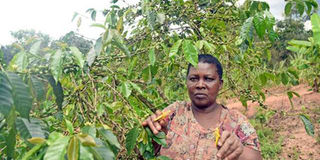Farmers suffer as locusts and virus outbreak threaten harvests

A farmer displays desert locusts in Kangurwe village in Mukurwe-ini last month. PHOTO |EVANS HABIL | NATION MEDIA GROUP
What you need to know:
- A huge swarm was spotted at Buffalo Springs Game Reserve in Isiolo, spreading fear and panic in pastoral communities.
- In Tharaka-Nithi, the locusts have invaded tea farms in Magumoni ward.
Several counties are battling new desert locust invasions despite the ongoing spraying of hatchlings. They include Embu, Isiolo, Laikipia and Tharaka-Nithi.
A huge swarm was spotted at Buffalo Springs Game Reserve in Isiolo, spreading fear and panic in pastoral communities.
The insects have also invaded Mururiri and Rukuriri in Embu, Kariunga in Laikipia, and Magumoni and Kiamuriuki in Tharaka-Nithi.
The invasions come at a time of increasing worry in north eastern Kenya over a rise in hatchlings that have started feeding on vegetation, threatening to destroy pastures and jeopardise food security.
The hoppers have devoured pastures in Wamba West and Waso wards in Samburu East with officials fearing that continued destruction in other areas could ignite resource-based conflicts.
FRESH INVASIONS
Fresh invasions were last week reported in Samburu and Kirinyaga counties. The Samburu swarms crossed over from Ethiopia through Lake Turkana.
Samburu County Special Programmes Chief Officer Daniel Leisagor said more than 85,000 acres (34,400 hectares) of vegetation had been destroyed by the voracious pests.
Isiolo County Agriculture Chief Officer Salad Tutana said the county was overwhelmed as it was battling both hatchlings and mature swarms.
The hoppers have devoured over 3,000 acres (1,214ha) of vegetation at Longopito and Lenguruma in Oldonyiro.
Officials have raised concerns that at Kipsing, the hatchlings, which have started flying short distances, may spread further.
“There is need for urgent intervention so that the few swarms that have started flying short distances don’t spread to Oldonyiro and cause havoc in Laikipia County,” an official, who sought anonymity, said.
Other huge hopper bands are at Waso West in Samburu, Shaba and Alamash in Isiolo, all covering about 50 square-kilometres. Ngurunit, Lojorin and Arsin are also covered by swarms, mostly from the Marsabit side.
LOCUSTS
In Tharaka-Nithi, the locusts have invaded tea farms in Magumoni ward. Swarms have also invaded Kiamuriuki in Mount Kenya Forest.
Farmers have urged the government to spray the locusts and compensate those who have incurred huge losses.
Mr John Mutembei, a farmer in Kiamuriuki, said he lost all his sukumawiki and napier grass to the insects that landed three days ago. He estimated the loss at Sh200,000.
Chuka/Igambang’ombe MP Patrick Munene said the locusts have caused huge losses.
By last month, the county had lost at least 2,403 metric tonnes of food crops to locusts, Governor Muthomi Njuki says.
In Tharaka North Sub-county, more than 30,000 acres (12,140ha) green grams, millet, sorghum, cowpeas and peas have been lost.
In the North Rift region, farmers are groaning under the weight of locusts and the Covid-19 double blow that is likely to disrupt this season’s planting plans.
FOOD SECURITY
Seed growers, including Kenya Seed Company, have halted work amid the coronavirus onslaught.
“Due to the (Covid-19) outbreak … we are temporarily closing our doors as instructed by the government to promote self-quarantine,” a notice by the Simlaw Seeds subsidiary of Kenya Seed Company stated at its outlets in Eldoret.
Simlaw advised all its customers “to purchase products by March 21 so as to assure food security in the country throughout the year.”
The notice has sparked a rush by farmers to beat the deadline.
Mr James Tiony, a farmer from Saos in Nandi County, expressed fears about the notice: “Unscrupulous dealers are likely to take advantage of the impending shortage of farm inputs to sell uncertified seeds,” he said.
HEAVY LOSSES
Swarms of locusts have invaded parts of Trans Nzoia, Bungoma, Elgeyo-Marakwet, Baringo, West Pokot and Turkana counties. Farmers fear that the pests will feed on germinating crops, causing heavy losses.
“The locusts have laid eggs, which are likely to hatch in the next few weeks, and feed on the crops, forcing us to incur additional costs in replanting,” said Mr Mathew Kosgey, a farmer from Lower Moiben in Uasin Gishu County.
“This will reverse the gains [we have] made in terms of timely planting to increase productivity and profitability of farming and enable the country to attain food security,” Mr Kosgey said.
Reporting by Waweru Wairimu, Alex Njeru and Bernabas Bii




